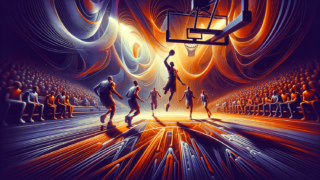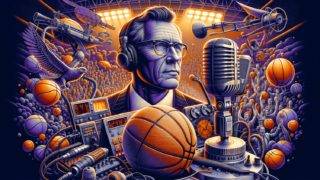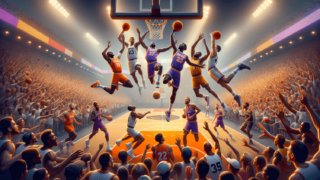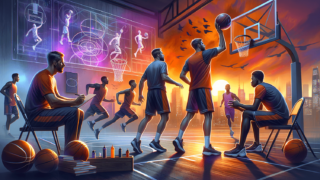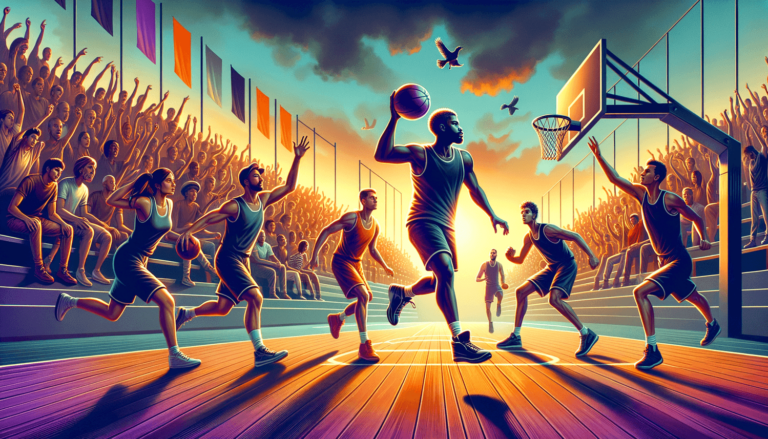
Intersection of Basketball and Social Activism
Written by: Basketball Universe
Last updated:

In recent years, the dynamic world of basketball has gone beyond the high-flying dunks and nail-biting buzzer-beaters, transcending into the realm of social activism. Today on our blog, we will embark on an in-depth exploration of how the sport has evolved into a powerful platform for change, amplifying the voices of its players and surrounding communities alike. So, whether you’re an avid hoops fan or a passionate advocate for social justice, let’s delve into the fascinating intersection of basketball and social activism, discovering how athletes are using the sport to foster positive and transformative movements both on and off the court. Stay tuned!
Intersection of Basketball and Social Activism
The intersection of basketball and social activism refers to the increasing role that basketball players, coaches, and organizations are taking in promoting and supporting social justice issues. This includes advocating for racial and gender equality, fighting against police brutality, and propelling the need for systemic changes within society. By utilizing their platforms and influence, key figures in the basketball community collaborate with activists, create initiatives, and amplify their messages to make a meaningful impact in the fight for social justice and equity.
The Powerful Impact of Athlete Advocacy
Social activism, particularly by athletes, holds a unique influence within our society as it exploits both on-field and off-field actions to raise awareness and propel change. Given that basketball possesses a rich history, its current status as a platform for social justice can be understood better by shedding light on notable athlete advocates and their contributions to the cause.
Bill Russell – An Early Champion for the Cause
Bill Russell, one of the greatest players in basketball history, was an active supporter of civil rights throughout his career. In the early years of the NBA, Russell stood out by not only showcasing his unsurpassed skills on the court but also by fearlessly addressing social and political issues. He participated in several anti-segregation protests, offered his support to prominent figures like Muhammad Ali in their battles against injustice, and even refused to play in games where he encountered discrimination. Russell’s activism showed that star athletes can use their status to drive conversations about societal change and gave the future generations of players a blueprint for intertwining their game and narrative.
LeBron James – A Modern-Day Trailblazer
Today, LeBron James is synonymous with basketball greatness and activism. As one of the most prominent faces of the NBA, LeBron has used his platform to further civil rights causes and promote social justice. He has tirelessly advocated for Black Lives Matter, pushed for voter rights, and been a vocal critic of police brutality. Additionally, James’ I PROMISE School initiative provides educational opportunities to underprivileged students, ensuring that their socioeconomic status doesn’t impede their dreams. Like Bill Russell before him, LeBron’s advocacy demonstrates the powerful impact athletes can have by speaking up and using their influence for positive change.
Teams Taking a Stand
Moving beyond individual efforts, basketball teams, both professional and collegiate, have united their forces to advocate for social justice. These teams’ actions are not limited to mere gestures but often engage a wide range of platforms and opportunities to instigate change.
The Milwaukee Bucks’ Call for Racial Justice
The Milwaukee Bucks’ decision to boycott a playoff game in protest of the shooting of Jacob Blake in August 2020 marked a pivotal moment in the intersection of basketball and social activism. This courageous move ignited a wave of actions across the sports world, with other NBA teams, as well as several MLB, WNBA, and MLS franchises, choosing to stand in solidarity with the Bucks. The worldwide attention this collective effort gathered was instrumental in showing the impact that sports teams can have on fostering dialogue surrounding crucial social issues.
NCAA Teams Raising Their Voices
Collegiate basketball teams have also stepped up in using their platforms to call for change. Several universities have seen their athletes take a knee during the national anthem or host events to raise funds for social justice organizations, advancing awareness among their peers and communities. As these teams sit at the precious nexus between sports and education, their participation in the fight for social justice serves as an important driver for developing more educated, empathetic, and engaged citizens.
The NBA’s Commitment to Social Justice
Following the tragic killing of George Floyd, the NBA has taken significant steps to transform the league into a catalyst for deeper conversations about racial and social inequalities. By painting “Black Lives Matter” on courts, allowing players to include activist messages on their jerseys, and creating the NBA Foundation, which focuses on empowering the Black community economically, the NBA has made a resounding commitment to support and amplify social causes through basketball.
Advocacy Through League Initiatives
Beyond adorning courts with activist messages, the NBA has launched a series of programs under the moniker NBA Voices, aimed at promoting empathy, unity, and inclusiveness. This platform serves as a central hub where fans can access stories, initiatives, and resources that promote dialogue, understanding, and change in their communities. By creating such programs, the NBA has further developed the intersection of basketball and social activism, showcasing the league’s dedication to fostering positive social change.
Evolving Activism: A Look at the WNBA
The Women’s National Basketball Association (WNBA) players have also been at the forefront of advocating for social justice, adding their powerful voices to the issues of gender and racial equality.
Equality for All – Advocating for Social Change
Galvanized by the Black Lives Matter movement and globally echoing calls for social justice, WNBA players address and confront issues on multiple fronts. From speaking up against police brutality to campaigning for LGBTQ+ rights and addressing the gender pay gap, these athletes exemplify the power of unity in their efforts. While their activism has had a significant impact on opening up conversations and driving change, the WNBA players have demonstrated that the intersections between basketball and social activism persistently evolve and inspire others to act.
Grassroots Activism in Basketball
With basketball being undeniably rooted in community culture, the potential for local activism is immense. Grassroots basketball organizations and programs play a vital role in addressing social justice concerns, using the sport as a common ground to build connections and rapport that ultimately promote change.
Hoops with a Purpose
Local basketball programs are increasingly incorporating activism into their objectives, aiming to teach not only basketball skills but also the values and importance of social justice. These programs typically engage youth, promoting civic engagement, leadership, and community service. By focusing on the grassroots level, these organizations demonstrate that merging basketball with social activism can help instigate change from the ground up, inspiring future generations to act on the causes that matter most.
Conclusion
From monumental figures like Bill Russell and LeBron James to teams uniting under a cause, the intersection of basketball and social activism has come a long way. The NBA and the WNBA’s commitment to boosting activism and community efforts further bolster the impact of sport on driving meaningful change. As inherent to basketball history and the global sports realm, the power athletes wield in effectuating societal advancement continually serves as an inspiration and poignant reminder of the bond between sports and social justice.
Inspiring Change Off the Court
Social activism in basketball not only encompasses athlete advocacy, team unity, and league-level initiatives, but also extends to players’ individual efforts to bring about change in communities through charitable work, investment in underprivileged neighborhoods, and educational opportunities.
Empowering Communities Through Education
Education plays a crucial role in breaking the cycle of poverty and addressing many of the social issues that plague marginalized communities. Several NBA stars have pivoted to investing in educational causes, such as LeBron James’ I PROMISE School, which aims to provide holistic educational support to low-income students in Akron, Ohio. Similarly, other players are starting or contributing to scholarship funds, opening schools, or speaking at educational events to inspire the younger generation, ultimately working towards a more equitable society.
Investing in Underserved Neighborhoods
Recognizing the potential in underprivileged areas, several basketball players-turned-community leaders invest in neighborhood revitalization projects. From affordable housing to small business development or even opening up community centers, these initiatives work to foster inclusion, safety, and opportunities for those living in neglected communities. Players like Damian Lillard, who actively supports various charities and led the establishment of a tech hub in Portland, are key examples of how basketball figures can contribute to social activism through investment in communities with untapped potential.
Working in Solidarity with Social Justice Groups
Partnering with or supporting social justice organizations, players and teams can greatly amplify the impact of activism within basketball. By collaborating with these organizations, the basketball community ensures that their efforts are directed efficiently and aligned with the goals and values of established entities working in social justice fields.
A Platform to Amplify Voices
In recent years, many players have chosen to partner with a wide range of non-profit organizations, offering their financial support or using their reach to spread awareness about different causes. From organizations like the NAACP, ACLU, and Color of Change to smaller, local initiatives, basketball players have shown their commitment to working together for change, further highlighting the role that solidarity plays in achieving true social activism within the sport.
Encouraging Global Change
Basketball’s worldwide appeal makes it a powerful medium for social activism on a global scale. Players and coaches hailing from different countries use the sport to address and promote conversations around various regional and international socio-political issues, thus elevating the power of basketball to transcend cultural barriers.
Expanding the Dialogue
Whether it be advocating for human rights, fighting against climate change, or addressing any pressing issue impacting communities across the globe, basketball offers a unique and accessible platform to engage and inspire the masses. By raising awareness and uniting under the shared language of sports, basketball figures can bridge the gaps amongst people of different cultures, fostering global understanding and change.
Collaboration Across Leagues
As the basketball world crosses cultural and regional lines, the opportunity for collaboration between different leagues and countries only grows stronger. By fostering respect and cooperation amongst international players and coaches, the sport’s potential to be a driving force for global social activism can be fully unleashed, forever establishing basketball as an important catalyst for creating a better world for all.
Frequently Asked Questions
If you’re looking to dive even deeper into the intersection of basketball and social activism, check out the following common questions and answers. Explore how the sport continues to break barriers while making an impact in advocacy, social justice, and human rights. Stay informed and engaged with the many dimensions and implications of basketball’s role in social activism.
How does basketball promote social activism?
Basketball promotes social activism through the actions of individual players, teams, and leagues, as well as partnerships with social justice groups, investments in communities, and worldwide reach. By using their platform and influence, both on and off the court, the basketball community can draw attention to critical issues, spark conversation, and inspire change.
When did social activism begin in basketball?
While forms of social activism have always been present in basketball, one of the earliest notable examples is Bill Russell’s advocacy during the Civil Rights Movement in the 1950s and 1960s. His activism trailblazed the path for future generations of players to become champions of social change.
Are there any restrictions on what basketball players can advocate for?
While no formal restrictions exist, players may receive consequences for certain types of advocacy, especially if their chosen cause is politically sensitive or controversial. However, leagues like the NBA have shown increased support for athlete activism and social causes in recent years.
How have college basketball teams participated in social activism?
Many college basketball teams engage in social activism through solidarity gestures such as kneeling during the national anthem, hosting events to raise funds for social justice organizations, and starting crucial conversations about race, gender, and other social issues within their academic and athletic communities.
What are some charitable efforts by basketball players?
Several basketball players have made substantial charitable efforts by investing in education, starting their schools or scholarship funds, contributing to affordable housing projects, developing small businesses, and supporting various charities in different social injustice realms.
Why is basketball an effective platform for activism?
Basketball is an effective platform for activism because of its widespread appeal, close ties to local communities, and the influence of its athletes. Basketball players and teams can raise awareness, draw media attention, and use their resources and connections to support causes they believe in.
What kind of activism is found within the WNBA?
WNBA players are highly active in promoting social justice, advocating for racial and gender equality, LGBTQ+ rights, police reform, and other social issues. Their continued efforts expand the dialogue and drive change both within the sport and in broader society.
How do players partner with social justice organizations?
Players collaborate with social justice organizations by offering financial support, using their platforms to spread awareness, or actively participating in the initiatives led by these organizations. Such partnerships help amplify the impact of both the players and the organizations working for social change.
How do basketball players participate in global activism?
Basketball players take part in global activism by using the sport’s universal appeal to raise awareness about international issues, participating in global charitable efforts, and partnering with or sponsoring organizations that fight for human rights and social justice worldwide. This contributes to a more inclusive and empathetic global society.
How does grassroots activism in basketball help communities?
Grassroots activism in basketball helps communities by engaging youth in civic leadership, fostering empathy and understanding, and inspiring positive change from the ground up. Basketball programs and organizations can use the sport to teach values and the importance of social justice, helping to shape future generations and create more equitable communities.
Featured Posts
- No pillar pages found.

